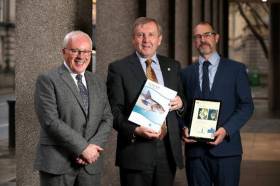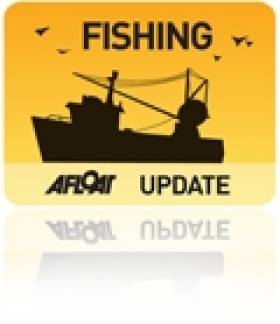Displaying items by tag: Stock Book
Marine Institute Launches 2021 Stock Book
The Marine Institute has today launched the 2021 Stock Book, the annual publication which provides the latest impartial scientific advice on the status of 74 key fish stocks of interest to Ireland. It is available for download or through an interactive online application (www.marine.ie).
This is the 29th edition of the annual book, which also contains the latest management advice used by decision makers to set sustainable catch levels and fishing quotas for 2022. The publication is an invaluable reference guide to a wide audience, including the Department of Agriculture, Food and the Marine, the fishing industry, marine scientists, environmental NGOs, third level institutes and financial institutions.
In 2020, Irish vessels landed approximately 190,000 tonnes of wild caught fish worth more than €250 million at first sale. This, in turn, supports a valuable processing industry and other activities in our coastal communities.
Ensuring long term sustainability is a key objective of the Common Fisheries Policy and all stakeholders. To that end, every year, the Marine Institute undertakes an extensive data collection programme - multiple scientific surveys cover approximately 327,000 square nautical miles over 263 days, equating to 1,545 scientist days-at-sea.
Onshore and at sea sampling programmes measure over half a million fish and estimate age for a further 50,000 individuals across all commercial species. Irish data is compiled with that from other countries through the intergovernmental organisation ICES (International Council for the Exploration of the Seas). Marine Institute scientists play a key role in carrying out the assessments and developing the scientific evidence and advice at ICES. The Stock Book integrates the latest scientific advice from ICES with relevant information on Irish fisheries.
The Minister for Agriculture, Food and the Marine, Charlie McConalogue TD said "I am impressed by the quantity and quality of data collected by our marine scientists in the Marine Institute. This work must inform all aspects of fisheries management and support the effective protection of our marine ecosystem in the seas around our coast and for the fisheries on which our fleet are reliant. It is important that the results of all the work is made accessible to industry and other stakeholders and I very much welcome the Stock Book for 2021 which I have now received."
Michael Gillooly, Interim CEO of the Marine Institute, said, "The seas around Ireland are among the most productive and biologically sensitive areas in EU waters. The Marine Institute conducts comprehensive and broad science programmes in order to sustainably monitor and develop this valuable resource.
"The scientific advice and services provided by our scientists to stakeholders are essential to supporting a sustainable ocean economy, protecting and managing our marine ecosystems and meeting EU obligations. As part of the services provided, our scientists also participate in, and lead, international working groups that assess fish stocks and provide scientific advice on how many fish can be safely removed from this renewable resource. This is essential in sustaining our ocean economy for our coastal communities."
Dr Ciaran Kelly, Director of Fisheries Ecosystem Advisory Services at the Marine Institute, said, "The interactive app developed by the Marine Institute is shaping thinking on how independent scientific advice can be delivered to fisheries managers and other stakeholders in the future ensuring that the best available scientific evidence for decision making is easy to access and transparent to all."
The gradual increase in the number of stocks that are sustainably fished, in line with Common Fisheries Policy objectives, has continued. Stocks of haddock, anglerfish (or monkfish), megrim, tuna, and some of the Nephrops (Dublin Bay Prawns), have increased in recent years and continue to be sustainably fished. Work also continues on stocks such as cod, herring and whiting.
The 2021 Stock Book is available electronically on the Marine Institute's website here and as an interactive app here. Most of the scientific work that delivers the Marine Institute's Stock Book is funded under the European Maritime, Fisheries and Aquaculture Fund (EMFAF).
Marine Minister Receives Marine Institute’s Annual Stock Book For 2019
Marine Minister Michael Creed took receipt of the 2019 Marine Institute Annual Stock Book yesterday, Thursday 21 November.
One of the institute’s primary annual publications since 1993, the Stock Book provides scientific advice on commercial fish stocks of interest to Ireland.
“The fishing industry is a vital part of Ireland's ocean economy,” the minister said. “The information presented by the Marine Institute in the Stock Book is critical to the preparations for the annual Fisheries Council negotiations which this year will take place in Brussels on the 16th and 17th of December.
“The detailed stock-by-stock guide ensures we have the most up-to-date scientific advice on this renewable resource.”
The Stock Book forms an important component of the sustainability impact assessment presented to Dáil Éireann annually before the EU fisheries negotiations commence.
This year advice was given for 74 stocks, and results show continued improvement in the number of stocks that are sustainably fished
In addition, the Stock Book serves as a reference guide to the fishing industry, managers, marine scientists, environmental NGOs, third level institutes, financial institutions and the wider public.
Much of the scientific work that delivers the Stock Book is funded under the European Maritime Fisheries Fund scheme.
The Marine Institute says scientific advice and services provided by scientists to the Department of Agriculture, Food and the Marine are a key focus of its Strategic Plan 2018-2022.
“These scientific services are essential to supporting our sustainable ocean economy, protecting and managing our marine ecosystems and meeting EU obligations,” said Marine Institute chief executive Dr Paul Connolly.
The institute’s scientists participate in, and lead, many international working groups at the International Council for the Exploration of the Seas (ICES), which assess fish stocks and provide scientific advice on how much can be sustainably fished.
“ICES is a very important organisation for the Marine Institute where scientists from many countries share data and work together to deliver the impartial scientific advice required by the fisheries managers. This advice is presented in the Stock Book and is essential to sustaining our coastal communities,” Dr Connolly said.
The 2019 Stock Book is available as a PDF to read or download HERE, and also this year as an interactive map.
Marine Minister Receives Annual Fish Stock Book
#Fishing - Marine Minister today (Tuesday 28 November) received the Marine Institute’s annual Stock Book for 2017.
The Stock Book, one of the principal annual publications of the Marine Institute, provides the latest impartial scientific advice on commercially exploited fish stocks of interest to Ireland.
Provididing the latest scientific advice for 61 fish stocks, the publication is used by the Department of Agriculture, Food and the Marine at the annual quota negotiations with the EU in December of each year and throughout the year at fisheries management meetings.
"The information presented by the Marine Institute in the Stock Book is critical to the preparations for the annual fisheries negotiations which are coming up in the next fortnight,” said Minister Creed.
“The detailed stock-by-stock guide ensures we have the most up to date scientific advice at our finger tips. The fishing industry is a vital part of Ireland's coastal economy, with Ireland’s quotas worth approximately €226 million in 2017.”
Marine Institute chief executive Dr Peter Heffernan added: “The seas around Ireland are among the most productive and biologically sensitive areas in EU waters. Our fisheries scientists spend collectively over 1,000 scientific days each year at sea on the Marine Institute's two research vessels, surveying fish stocks and habitats so that we can have the best available information on the state of our stocks.
“Throughout the year our scientists also participate in and lead ICES working groups on international fish stocks in order to maintain healthy ocean ecosystems and sustain Ireland’s important blue economy.”
Throughout the year the Stock Book also serves as a valuable reference to a wide audience, including the fishing industry, managers, marine scientists, environmental NGOs, third level institutes, financial institutions and those with an interest in the status and management of marine fisheries resources in the waters around Ireland.
The Stock Book is available electronically on the Marine Institute’s website.
Sustainability of Fish Stocks Improving Says Minister
#Fishing - Dr Peter Heffernan, CEO of the Marine Institute, presented the Minister for the Marine Simon Coveney with The 2012 Stock Book ahead of the EU Fisheries Council negotiations next week, noting an improvement in certain fish stocks with a higher number of stocks sustainably fished in 2012 compared with 2011 - as Tom McSweeney writes about in his column last Friday.
The Stock Book gives an overview of 59 stocks from which Ireland has an EU quota allocation and will be used to inform discussions and decisions on Total Allowable Catches (TACs) fishing quotas for 2013. TACs and quotas will be decided at the December EU Fisheries Council on 18-20 December which will be attended by the minister, who has lately faced criticism over the proposed deep-sea salmon farm in Galway Bay.
Minister Coveney said: "I welcome the comprehensive review carried out by the Marine Institute showing the state of fish stocks that are of importance to Ireland. Of the 59 stocks in which Ireland has a share of the EU TAC, 42% are now fished sustainably compared to 36% in 2011. The state of the resource base in terms of the biomass, the population of mature fish in the stock, has also improved. The number of depleted stocks has declined from 12 to 8.
"It is good to see progress on delivering sustainable fishing. Further efforts are needed both in terms of setting TAC levels and also taking other measures such as reducing catches of juvenile fish and dealing with unacceptable levels of discards.
He added: "Having the latest scientific information at my fingertips is essential at the December council. My approach to the negotiations will be to utilise this science to ensure EU fishing policy secures the long term sustainability of the industry.
"The December Council negotiations must concentrate on achieving a more practical and pragmatic regime for the fishing industry, grounded in the scientific data available in the Stock Book.”
The Stock Book advice is developed using the latest available research, assessments and advice on the fisheries resource. Irish scientists collaborate with other international scientists at the International Council for the Exploration of the Seas (ICES).
“ICES is a key forum for Ireland where our scientists develop impartial scientific advice that meets best international standards,” said Dr Heffernan.
The Stock Book is presented annually to Department of Agriculture, Food and the Marine. The information is of vital importance in serving Ireland during the annual TAC negotiations at the various EU Council of Fisheries meetings, but principally at the December council meeting where the quotas for the following year are set.
It is also of interest to a wider audience, including the fishing industry, marine scientists, managers, environmental NGOs, third level institutes, financial institutions and those with an interest in the status and management of marine fisheries resources in the waters around Ireland.
The Stock Book has been published by the Marine Institute since 1993 and has evolved considerably in that time period. It continues to evolve in a changing fisheries advisory environment. The Stock Book is available electronically on the Marine Institute’s website HERE.
































































